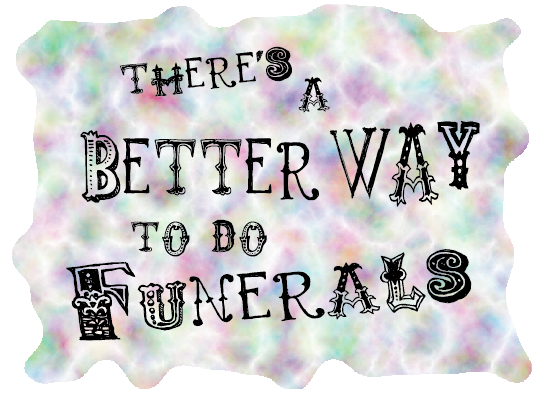A better way to do funerals is to plan your own ahead of time.
Planning your own funeral isn’t for the faint of heart. But what if it turns out that it’s actually heart-warming, healing, and hopeful? That an activity we dread could be the best move we never considered making before?
Let’s face it, we’re all just taking turns saying goodbye to one another. We’ll each have our special day. So given this epidemic of mortality, we should have a bit more acceptance of it. For starters, we could dial back on our denial and shore up on our cooperation. Which basically equates to a healthy appreciation of the life cycle and how to become friends with it, start to finish.
Why would we take on such a morbid task as planning for our own funeral? Aside from the obvious reason — “It relieves the burden from your family” — if we rummage around a bit we can uncover some unsung, yet intriguing possible incentives. (Order of importance determined by personal psyches and circumstances.)
1) It’s a fear-of-death cure. Maybe not entirely, but it’s sure to make a dent in whatever anxiety you have. And we all have some, let’s be honest. Taking the first step in planning is the hardest, but once you’ve started down the road it gets easier, and abomination gradually becomes amiable acceptance. No bitterness, no resistance. We’ll never like it, but death is our shared future, and frankly, eternal human existence is really hard to fathom.
2) Control. You are the main attraction of your funeral, dead as a doornail though you’ll be. If your final fling is a flop (i.e. devoid of your personality) that’s the last impression left for those who’ve loved you so deeply. Take a little ownership of your guaranteed leave-taking by helping out with the party ahead of time. Refusing to have a say in the matter of your own goodbye is like leaving dirty dishes in the sink. Better to make important decisions while on this side of the dirt.
3) Solace for survivors. Seeing that you were on speaking terms with your eventual demise makes it easier for your family to accept it, too. Seeing your own handwriting (optimal way to do it) with your last wishes proves that you were okay with going; no need for excessive railing against reality. Your acceptance is contagious in the best possible way.
4) Green stuff. It’s hard to have a funeral on the cheap, even if we’re not showy and eschew lavish spending. That there are respectful standards (set by funeral directors) that must be maintained is difficult to fully shake off. And because we avoid death and funeral discussion at all costs, it’s a challenge to veer from what’s always been done. A plain pine box does the job just as nicely as a fancy $12,000 job. A grandchild’s third grade crafts project can hold ashes just as well as a $1,500 marble urn. Give your family your express permission for hand-made, personal, or low-cost choices to trump flashy merchandise (if that’s more your style).
5) Saying thank you. A complete reversal from the conventional rationale that a funeral is people paying their respects to you — how about that you are paying your respects to them? Think about that. You have the ability to thank the people in your life, let them know why you loved them, how important they were to you, how grateful you were for their place in your life. Not knowing your expiration date should not deprive you of the joy in saying “Thank you for being in my life.” Write those thoughts down ahead of time. Let your sendoff be as much a message from you to them as vice-versa.
6) Self love. In order to write down your goodbye wishes you first have to believe you’re worth it, that you’ll be missed and mourned, and that you matter. Too often “Just throw me out with the trash” is a cover-up for low self-esteem or insecurity. Dig deep into the trust that you have made a difference. “I deserve a party when I go!” Say it out loud 10 times until you believe it.
7) Self expression. We go through life staking a claim to our individuality — our tastes and styles in countless aspects of life. And it all goes to hell in a hand basket with a generic, lackluster goodbye with nary a trace of our distinctive personality. It’s not the Victorian era; our ‘new’ world lets us be ourselves, it’s time we extend this to our farewells. This is your last chance to make a statement with your bad self. Leave your people ideas for personal touches so that your spirit is felt and experienced. ’Tis the number one way to make a send-off memorable and meaningful.
8) Maybe your family doesn’t have the best track record for good parties. Just a thought.
9) Safeguarding. If you’ve mentioned your last wishes to your family in conversation and believe that means it’s been taken care of, it’s a pipe dream. At the time of a death, people can’t think straight. They’re grief-stricken, possibly in shock, and all of a sudden have countless things to take care of and arrange. Trying to pull from their memory, with accuracy, what you said in conversation maybe many years ago, under now terrible conditions… well, it’s asking a lot of someone. Your thoughts on what to do when you croak need be to clearly written down on paper and residing in a known location to qualify as having been successfully communicated.
10) Delight! Creating your own goodbye party ahead of time is an adventure, an education, and a treat. It’s truly the opposite of doom and gloom. There are so many new options and alternative these days, and it’s your right to tell your family ixnay on the morbid and double up on the champagne. Your sendoff can be upbeat and light-hearted; in fact, if you’re not smiling while planning it you’re not doing it right.
‘Life celebration’ can and should be exactly that—not just in name, but in emotion, atmosphere, and energy. Leaving others the inside scoop on what mattered to you most, and permission to be creative and original in seeing you off, is a win-win. They are provided a profound comfort, and you get present-tense pleasure out of knowing that what made your life so meaningful and cherished will be remembered.

